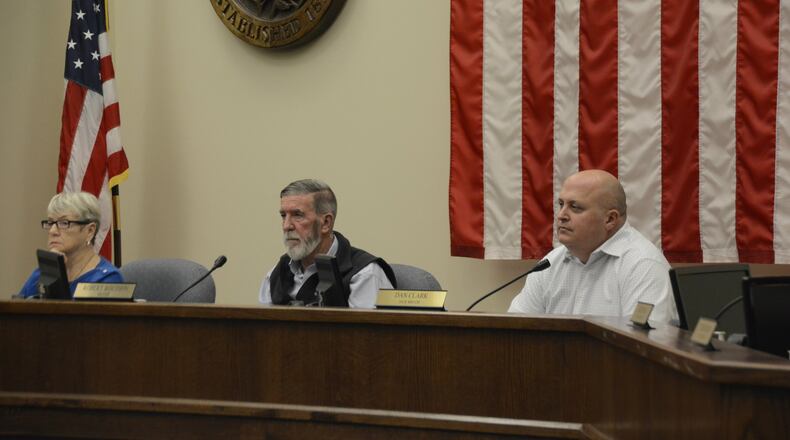It’s an oasis of bipartisanship in a country where bitter party politics have become the norm. Several local officials told the Journal-News those antics have no business in local government.
“At the local level, partisanship with respect to political parties matters very little,” said Hamilton City Manager Joshua Smith. “What matters to residents and small businesses are results.”
That’s the same for other corners of the county as officials echoed Fairfield Mayor Steve Miller’s sentiments: “Check the politics at the door.”
POLITICS: Rep. Jim Jordan: GOP lost House because it didn’t deliver on President Trump’s promises
Twenty-three of 34 local governments in Butler County are run by a bipartisan group of elected officials, and 16 of those local governments have at least one Democrat elected to its ranks.
“Political dynamics change in the local levels,” said Cedarville University political science professor Mark C. Smith.
He said it could be due to voters’ disassociation to the national and polarizing issues from local issues like infrastructure, public utilities and local taxes.
“Also, it is much more likely that voters will actually know, or at least know people who know, local candidates for school board or city council,” he said. “Decisions will not be made based on abstract labels, but based on personal connections and knowledge.”
National, and to a lesser extent state and county, politics differ from local government politics in many ways. One, they are partisan as candidates are identified with an “R” or “D.” They are also more loyal to their party because of money and/or endorsements.
But voters don’t typically see political parties campaigning involved in races for city and village councils, school boards and township trustee boards.
Hamilton has one of the more bipartisan councils in Butler County. There are two Democrats, two independents and four Republicans, according to the board of elections. The city is experiencing a strong revitalization of its city, and in particular, its downtown, and City Council has played a part in the city’s renaissance.
POLITICS: Ohio Libertarians say they may sue to keep ballot access
All but one of Fairfield’s city council members are Republicans (they have one independent on the board), and as a council member, “When you walk through the door, your thought should be, ‘How can we make Fairfield better?’” Miller said. “Everybody is respected for their opinion. You might have a difference of opinion, but you agree to disagree and move on.”
That doesn’t happen at the national, and many times at the state, level, which is why Miller said the more decisions made at the local level, the better.
“The federal government should delegate more to the states, and the states should delegate more to the local governments,” he said. “It’s easier to control a company of 15 people than a company of 115 people.”
The only way to get things done at any level is to work with one another, said Hamilton Mayor Pat Moeller. He said Hamilton, and all Butler County local governments, “understand the importance of getting along and talking.”
“The walls don’t help in creating jobs, and retaining jobs,” he said. “I don’t think our citizens want polarization. You can have a strong opinion, you can work toward what you believe — you can still be civil — and at times you work to negotiate to improve the current problems that you are facing. Polarization among the parties doesn’t accomplish that.”
Monroe City Council has a similar makeup of its elected officials — three Democrats, three Republican and one independent — but Mayor Bob Routson said party politics very rarely come into play.
“With the size of Monroe, a whole lot of what we do is based on what the community needs are. We have a great staff here that works for the city of Monroe, and their vision on some of the things they bring to city council makes it pretty easy,” he said. “Now, I won’t say there aren’t decisions or votes made when it comes to the council, it could be because if they’re liberal or they’re conservative, but for the most part they are made for the good of the community.”
But the big difference with local politics is the strength of their relationship with the constituents.
“You don’t always shop at the same grocery stores as your constituents; you don’t always eat at the same restaurants; you don’t have most of your meetings where the electorate voted you into office,” said Smith, who has worked in city government for 20 years, the last eight with Hamilton. “At the local level, it is easier to look past the ‘R’ or ‘D’ and know someone as a person. If you are upset about an issue locally, it is generally easier to vent to your local elected official than to someone holding a higher office, who is often in meetings in Columbus or D.C.”
About the Author

